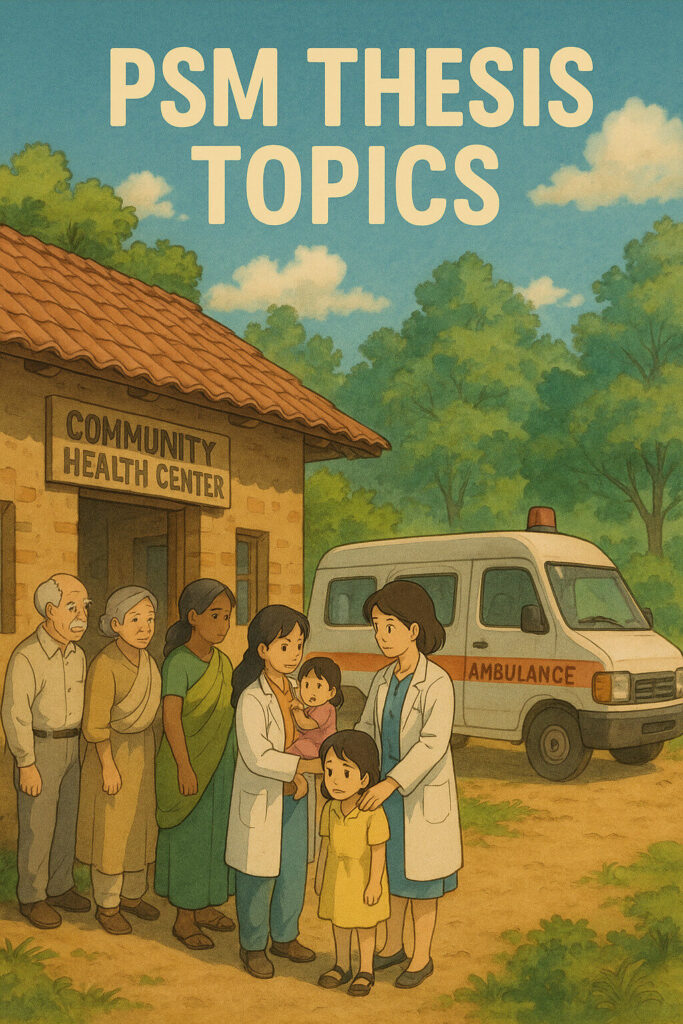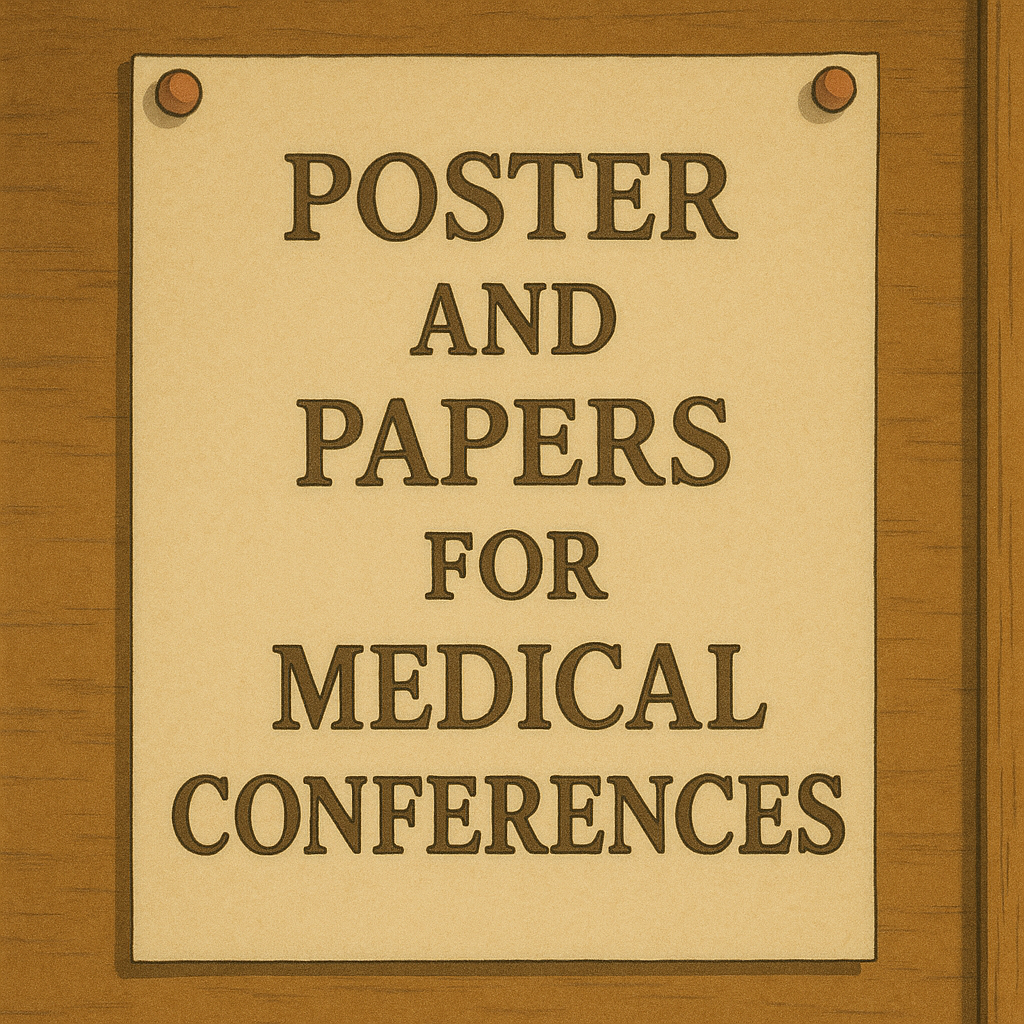PREVENTIVE AND SOCIAL MEDICINE THESIS TOPICS

PSM THESIS TOPICS
Careful selection of PSM thesis topics—Preventive and Social Medicine—is crucial for addressing pressing health issues at the community and population level. High-yield PSM thesis topics include areas such as epidemiology, biostatistics, health policy, occupational health, maternal and child health, environmental health, and health promotion. By focusing on impactful PSM thesis topics, researchers contribute directly to policy formation, health education, and disease prevention strategies.
A well-researched and data-backed thesis on relevant PSM thesis topics increases the likelihood of publication in reputed medical journals, a necessary requirement for faculty promotions and academic appointments in medical colleges. Selecting forward-thinking PSM thesis topics empowers public health professionals to create sustainable change, improve healthcare delivery, and build resilient communities through evidence-based research.
1. Epidemiology & Study Methodologies
A prospective cohort study of ambient air pollution exposure and incidence of acute respiratory infections among urban children using geospatial modeling and health surveillance data
A case-control outbreak investigation of foodborne illness in a community festival: microbiological analysis and risk factor assessment
A cross-sectional ecological study correlating state-level obesity prevalence with fast food outlet density and socio-economic indicators
A methodological validation of a mobile phone–based data collection tool versus paper-based surveys for field epidemiology investigations
A retrospective registry-based analysis of cancer incidence trends and age–period–cohort effects in a rural Indian district
An interrupted time-series analysis of the impact of tobacco taxation policy on cigarette consumption rates using pharmacy sales data
An in silico predictive modeling study of dengue outbreak timing using climate variables and machine learning algorithms
A mixed-methods sequential explanatory study of barriers to participation in national health surveys among marginalized communities
A systematic review and meta-analysis of screening test accuracy for hypertension detection in primary care settings
A narrative review of advances in epidemiological transition theory: implications for public health planning
2. Health Systems, Policy & Management
A cross-sectional evaluation of primary health center functionality using WHO Service Availability and Readiness Assessment (SARA) tool in underserved districts
A prospective before-and-after study of electronic medical record implementation on patient flow and data completeness in a district hospital
A cost–benefit analysis of community health worker–led home visits versus facility-based antenatal care for maternal mortality reduction
A case-control study of factors influencing retention of medical officers in rural postings using structured questionnaires and logistic regression
A methodological validation of the Health Resources Availability Mapping System (HeRAMS) in Indian health facilities
An in vitro stakeholder analysis workshop followed by Delphi consensus on key performance indicators for urban health mission implementation
A retrospective cohort analysis of referral patterns and outcomes in a hub-and-spoke model for emergency obstetric care
A systematic review of policy interventions for universal health coverage implementation in low- and middle-income countries
An in silico health financing model simulating the effects of insurance premium subsidies on out-of-pocket expenditure
A narrative review of public–private partnership frameworks in strengthening national immunization programs
3. Occupational & Industrial Health
A cross-sectional exposure assessment and pulmonary function study among textile factory workers using spirometry and air quality monitoring
A prospective cohort study of musculoskeletal disorder incidence in construction workers following ergonomic intervention and job rotation schedules
A retrospective case-control analysis of noise-induced hearing loss among factory employees: audiometric testing and noise dosimetry data
An in vitro biomonitoring study of urinary heavy metal (lead, cadmium) levels in battery manufacturing workers versus administrative staff
A methodological validation of wearable vibration exposure sensors for real-time assessment in hand–arm vibration syndrome prevention
A randomized workplace intervention trial of cognitive–behavioral stress management on burnout and absenteeism in healthcare staff
A systematic review and meta-analysis of occupational skin disease prevalence and prevention strategies in healthcare workers
An in silico risk assessment of chemical exposures using job–exposure matrices and Monte Carlo simulation
A mixed-methods evaluation of occupational health service delivery in small-scale industries using key informant interviews and workplace audits
A narrative review of emerging nanomaterial exposure risks and regulatory responses in occupational settings
4. Environmental Health & Climate Change
A prospective panel study of indoor air quality and peak expiratory flow variability among asthmatic schoolchildren exposed to biomass fuel smoke
A cross-sectional remote-sensing analysis of urban heat island effect and its association with heat-related morbidity
A case-control assessment of groundwater arsenic exposure and skin lesion prevalence using GIS mapping and biomarker assays
An in vitro ecological toxicity bioassay of industrial effluent samples on local freshwater fish species
A methodological validation of low-cost air pollution sensors against reference-grade monitors for community surveillance
A randomized community trial of household water chlorination and health education on diarrhea incidence in rural villages
A systematic review of climate change mitigation policies and their co-benefits for non-communicable disease prevention
An in silico projection of vector-borne disease range shifts under IPCC climate scenarios using species distribution models
A mixed-methods study of community perceptions and adaptive behaviors toward flood risk in climate-vulnerable areas
A narrative review of sustainable urban planning interventions for health promotion and environmental resilience
5. Maternal & Child Health
A prospective community-based cohort study of iron–folic acid supplementation adherence and anemia prevalence in pregnant women using digital monitoring
A randomized cluster trial of community mobilization through women’s groups versus standard maternal health education on neonatal mortality reduction
A cross-sectional survey of breastfeeding practices and determinants using the WHO/UNICEF Baby-Friendly Hospital Initiative indicators
A retrospective cohort evaluation of kangaroo mother care impact on preterm infant thermoregulation and weight gain in neonatal units
An in vitro nutritional biomarker study of cord blood vitamin D and its correlation with birth outcomes
A methodological validation of community-based maternal death surveillance and response (MDSR) system in rural districts
A systematic review and meta-analysis of home-based versus facility-based postnatal care on maternal morbidity and mental health
An in silico demographic projection of under-five mortality trends under various intervention scale-up scenarios
A mixed-methods phenol-ethnographic study of barriers to uptake of institutional delivery services among tribal women
A narrative review of innovations in maternal vaccine development for protection against neonatal infections
6. Public Health Nutrition & Lifestyle
A cross-sectional nutritional assessment and dietary diversity study among adolescent girls in urban slums using 24-hour recall and food frequency questionnaires
A prospective randomized trial of school-based physical activity intervention versus standard curriculum on BMI and metabolic markers
A retrospective case-control analysis of ultra-processed food consumption and risk of hypertension in young adults
An in vitro glycemic index determination of traditional and modified staple foods using standard enzymatic methods
A methodological validation of a smartphone-based dietary tracking app against weighed food records in adults
A randomized community trial of sugar-sweetened beverage tax impact on purchase behaviors and caloric intake in urban neighborhoods
A systematic review of micronutrient fortification programs and their effectiveness in reducing deficiency disorders in low-income populations
An in silico simulation of food policy interventions on national average salt intake and cardiovascular mortality using policy modeling software
A mixed-methods evaluation of workplace wellness program acceptability and impact on employee dietary habits
A narrative review of behavioral economics approaches to promoting healthy eating and physical activity
7. Infectious Disease Prevention & Control
A prospective cohort study of pneumococcal conjugate vaccine immunogenicity and carriage reduction in under-two children
A cluster-randomized trial of community-wide mass drug administration versus targeted screening for soil-transmitted helminth control
A cross-sectional KAP (knowledge, attitudes, practices) survey on hand hygiene and supply chain assessment in primary schools
A retrospective outbreak investigation and molecular typing of multidrug-resistant typhoid fever cases in a peri-urban area
An in vitro evaluation of hand sanitizer formulations against enveloped and non-enveloped viruses using standardized virucidal tests
A methodological validation of rapid diagnostic tests for dengue NS1 antigen versus RT-PCR in field settings
A systematic review of integrated vector management strategies and their impact on malaria incidence
An in silico dynamic transmission model of COVID-19 under different non-pharmaceutical intervention scenarios
A mixed-methods ethnographic study of vaccine hesitancy determinants and community engagement strategies
A narrative review of One Health approaches for zoonotic disease prevention and control
8. Non-Communicable Disease Prevention & Control
A prospective cohort study of salt reduction education and home salt monitoring on blood pressure among hypertensive adults
A randomized controlled trial of mobile phone–based smoking cessation support versus standard counseling in young adults
A cross-sectional assessment of metabolic syndrome prevalence and its association with sedentary behavior in office workers
A retrospective cohort evaluation of statin adherence and cardiovascular event reduction in secondary prevention patients
An in vitro antioxidant capacity assay of novel plant extracts and correlation with in vivo biomarkers in human volunteers
A methodological validation of point-of-care HbA1c testing devices in community screening camps
A systematic review and meta-analysis of digital health interventions for Type 2 diabetes self-management
An in silico cost-effectiveness model comparing community screening strategies for early diabetes detection
A mixed-methods study of psychosocial barriers to physical activity in women with obesity using focus groups and accelerometer data
A narrative review of upstream policy interventions for reducing urban air pollution and associated NCD burdens
9. Health Promotion, Behavior Change & Community Interventions
A cluster-randomized trial of peer-led versus teacher-led sexual health education on adolescent contraceptive uptake in high schools
A cross-sectional evaluation of mass media campaign reach and impact on handwashing behavior during pandemic response
A prospective cohort study of faith-based organization–delivered health promotion on hypertension control in rural communities
A retrospective case-control analysis of community mobilization strategies and their association with polio immunization coverage
An in vitro AR-based simulation workshop development for training CHWs in emergency obstetric care: usability testing
A methodological validation of behavior change communication toolkits for tobacco cessation delivered by ASHAs
A systematic review of community-based participatory research interventions and health outcomes in marginalized populations
An in silico social network analysis of health information diffusion on WhatsApp during outbreak alerts
A mixed-methods participatory action research study on building resilience to climate-related health risks in coastal villages
A narrative review of digital storytelling as a tool for promoting mental health among adolescents
10. Recent Advances in Preventive & Social Medicine
A scoping review of artificial intelligence–driven disease surveillance systems: performance and ethical considerations
A prospective pilot study of wearable environmental exposure monitors and personalized risk feedback on health behaviors
A methodological assessment of blockchain-enabled health information exchange for pandemic preparedness
An in vitro validation of microfluidic point-of-care multiplex assays for simultaneous detection of common febrile illnesses
An in silico multi-criteria optimization of vaccination campaign logistics using agent-based modeling
A systematic review of CRISPR-based diagnostic platforms for rapid outbreak response in resource-limited settings
A mixed-methods study of tele-mentoring (ECHO model) effectiveness in building capacity for non-communicable disease management
A narrative review of emerging digital twin applications in public health planning and intervention evaluation
A pilot trial of geospatial risk mapping integrated with mobile health platforms for targeted malaria elimination
A narrative review of ethical frameworks for equitable deployment of novel public health technologies



